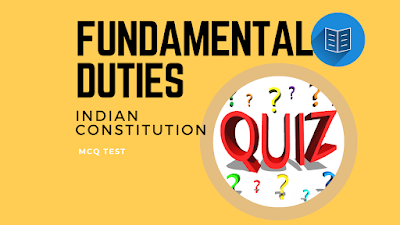Introduction: Fundamental Duties in Indian Constitution
Fundamental Duties are included in Part 4A of Indian Constitution. The Fundamental duties become a part of our constitution in 1976. They are highly moral in nature as it serve as a instrument to make one remember what anyone should do apart from enjoying Fundamental Rights.
The Fundamental Duties of the Indian Constitution play a pivotal role in shaping the values and ethics of Indian citizens. Their importance in competitive examinations cannot be understated, as they reflect the core values of responsible citizenship. In this blog post, we will explore these duties and understand how a Multiple Choice Question (MCQ) test on them can be a valuable tool for competitive exams.
Understanding Fundamental Duties
These duties aim to promote a sense of responsibility, foster a spirit of patriotism, and uphold the dignity and worth of all individuals. While they are not enforceable by law, they serve as a guide for citizens to be conscientious and ethical in their actions.
Importance in Competitive Examinations
1. Legal Knowledge: Competitive examinations in India, such as the Civil Services, Judiciary, and various state-level exams, often include questions related to the Constitution. An understanding of Fundamental Duties is essential, as they are also a part of the Constitution.
2. Ethical Awareness: Many competitive exams include sections on ethics and integrity. Knowledge of Fundamental Duties helps candidates develop a strong ethical foundation, enabling them to answer situational questions effectively.
3. General Awareness: Fundamental Duties foster a sense of civic responsibility. Competitive exams often test general awareness and current affairs, and having a grasp of these duties can help candidates stay informed and answer questions related to contemporary issues.
4. Essay and Interview Preparation: In exams with an essay and interview component, candidates can use examples related to Fundamental Duties to demonstrate their commitment to national values, societal welfare, and ethical conduct.
5. Governance and Administration: For exams focusing on governance, public administration, or public policy, understanding Fundamental Duties is crucial as they guide the principles of responsible citizenship that public servants should uphold.
Conclusion
Attempt the test and check your score. Scroll down the page, click on 'Start the Quiz' button and attempt other free test to evaluate yourself.
Click on Start The Quiz button.
You will have 60 seconds to answer each question.





0 Comments
If you have any comments, contact me